PSY4001 - A Comparative Analysis of Freudian and Eysenck Theories
VerifiedAdded on 2023/04/05
|17
|3508
|168
Essay
AI Summary
This essay delves into the realm of personality psychology, contrasting Freudian and Eysenck's theories. It begins with an introduction to personality and its significance, then elaborates on Freud's psychoanalytic theory, discussing its core tenets like the id, ego, and superego, while also addressing criticisms regarding empirical evidence and testability. The essay then transitions to Eysenck's personality trait theory, highlighting its emphasis on factors like psychoticism, extraversion, and neuroticism, alongside criticisms related to determinism and factor analysis. The strengths of both theories are examined, including the comprehensive nature of psychoanalysis and Eysenck's capacity to distinguish observable behavioral patterns. The essay concludes by emphasizing the similarities and differences between the two theories, particularly regarding the emphasis on cognitive mechanisms and the origins of personality traits, with Freud focusing on childhood development and Eysenck highlighting the role of genetics.
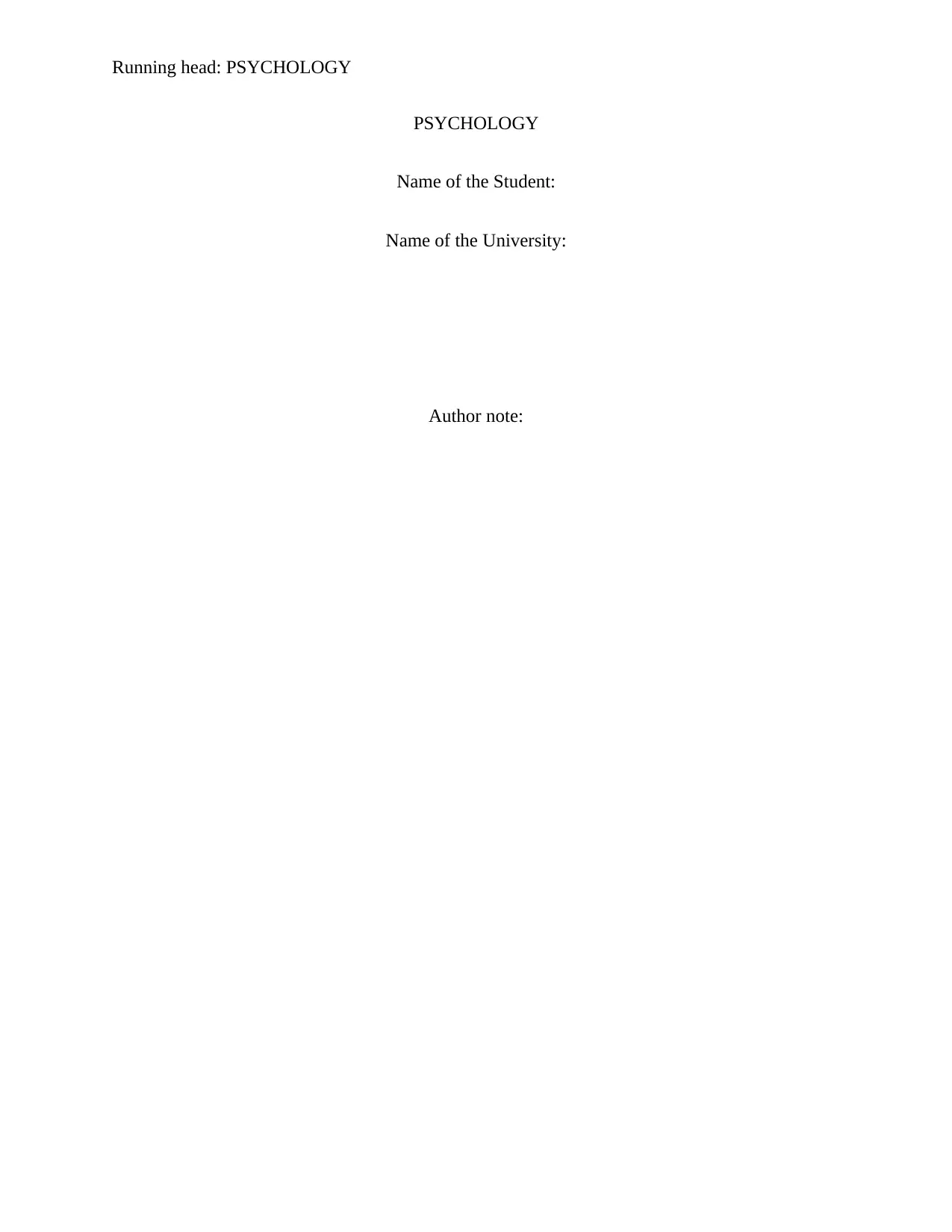
Running head: PSYCHOLOGY
PSYCHOLOGY
Name of the Student:
Name of the University:
Author note:
PSYCHOLOGY
Name of the Student:
Name of the University:
Author note:
Paraphrase This Document
Need a fresh take? Get an instant paraphrase of this document with our AI Paraphraser
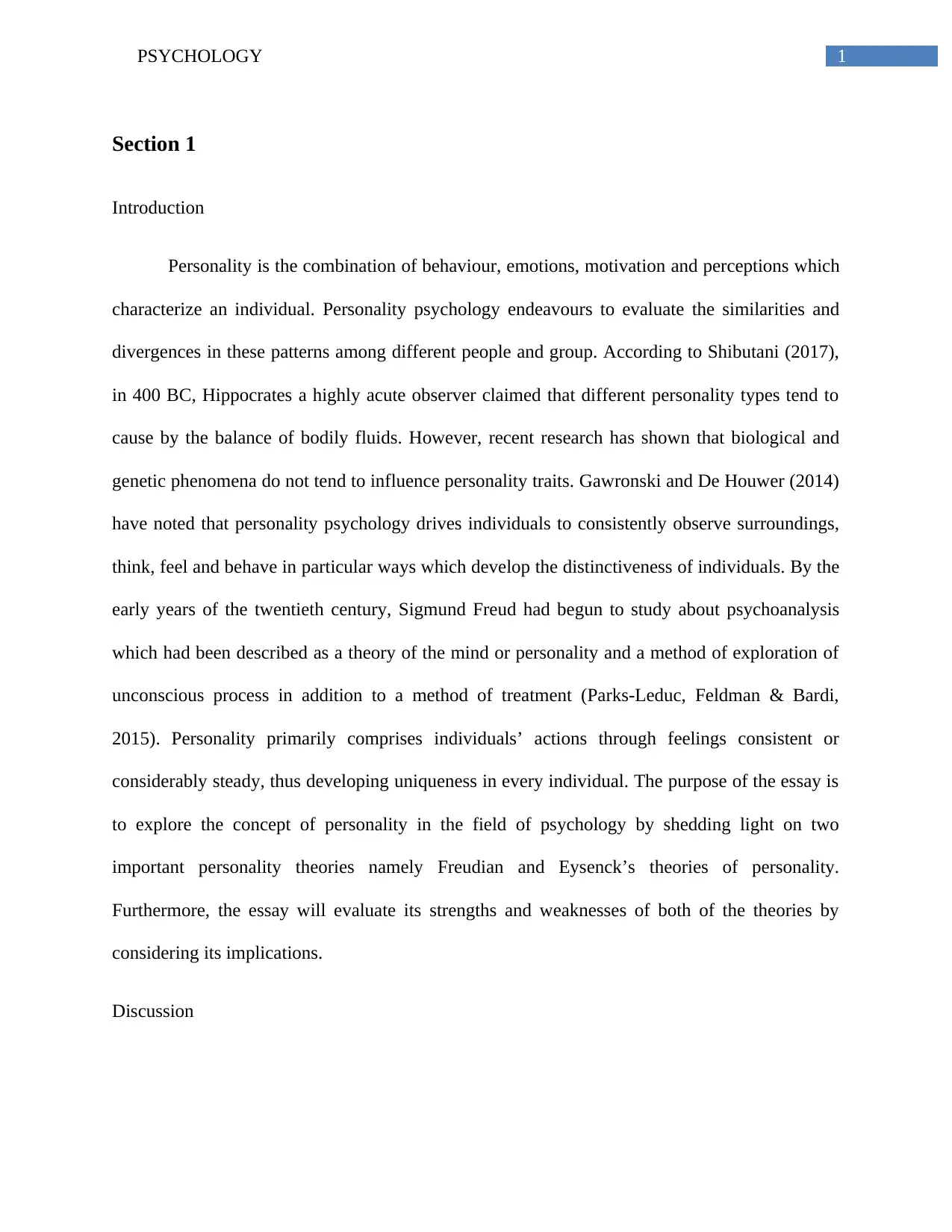
1PSYCHOLOGY
Section 1
Introduction
Personality is the combination of behaviour, emotions, motivation and perceptions which
characterize an individual. Personality psychology endeavours to evaluate the similarities and
divergences in these patterns among different people and group. According to Shibutani (2017),
in 400 BC, Hippocrates a highly acute observer claimed that different personality types tend to
cause by the balance of bodily fluids. However, recent research has shown that biological and
genetic phenomena do not tend to influence personality traits. Gawronski and De Houwer (2014)
have noted that personality psychology drives individuals to consistently observe surroundings,
think, feel and behave in particular ways which develop the distinctiveness of individuals. By the
early years of the twentieth century, Sigmund Freud had begun to study about psychoanalysis
which had been described as a theory of the mind or personality and a method of exploration of
unconscious process in addition to a method of treatment (Parks-Leduc, Feldman & Bardi,
2015). Personality primarily comprises individuals’ actions through feelings consistent or
considerably steady, thus developing uniqueness in every individual. The purpose of the essay is
to explore the concept of personality in the field of psychology by shedding light on two
important personality theories namely Freudian and Eysenck’s theories of personality.
Furthermore, the essay will evaluate its strengths and weaknesses of both of the theories by
considering its implications.
Discussion
Section 1
Introduction
Personality is the combination of behaviour, emotions, motivation and perceptions which
characterize an individual. Personality psychology endeavours to evaluate the similarities and
divergences in these patterns among different people and group. According to Shibutani (2017),
in 400 BC, Hippocrates a highly acute observer claimed that different personality types tend to
cause by the balance of bodily fluids. However, recent research has shown that biological and
genetic phenomena do not tend to influence personality traits. Gawronski and De Houwer (2014)
have noted that personality psychology drives individuals to consistently observe surroundings,
think, feel and behave in particular ways which develop the distinctiveness of individuals. By the
early years of the twentieth century, Sigmund Freud had begun to study about psychoanalysis
which had been described as a theory of the mind or personality and a method of exploration of
unconscious process in addition to a method of treatment (Parks-Leduc, Feldman & Bardi,
2015). Personality primarily comprises individuals’ actions through feelings consistent or
considerably steady, thus developing uniqueness in every individual. The purpose of the essay is
to explore the concept of personality in the field of psychology by shedding light on two
important personality theories namely Freudian and Eysenck’s theories of personality.
Furthermore, the essay will evaluate its strengths and weaknesses of both of the theories by
considering its implications.
Discussion
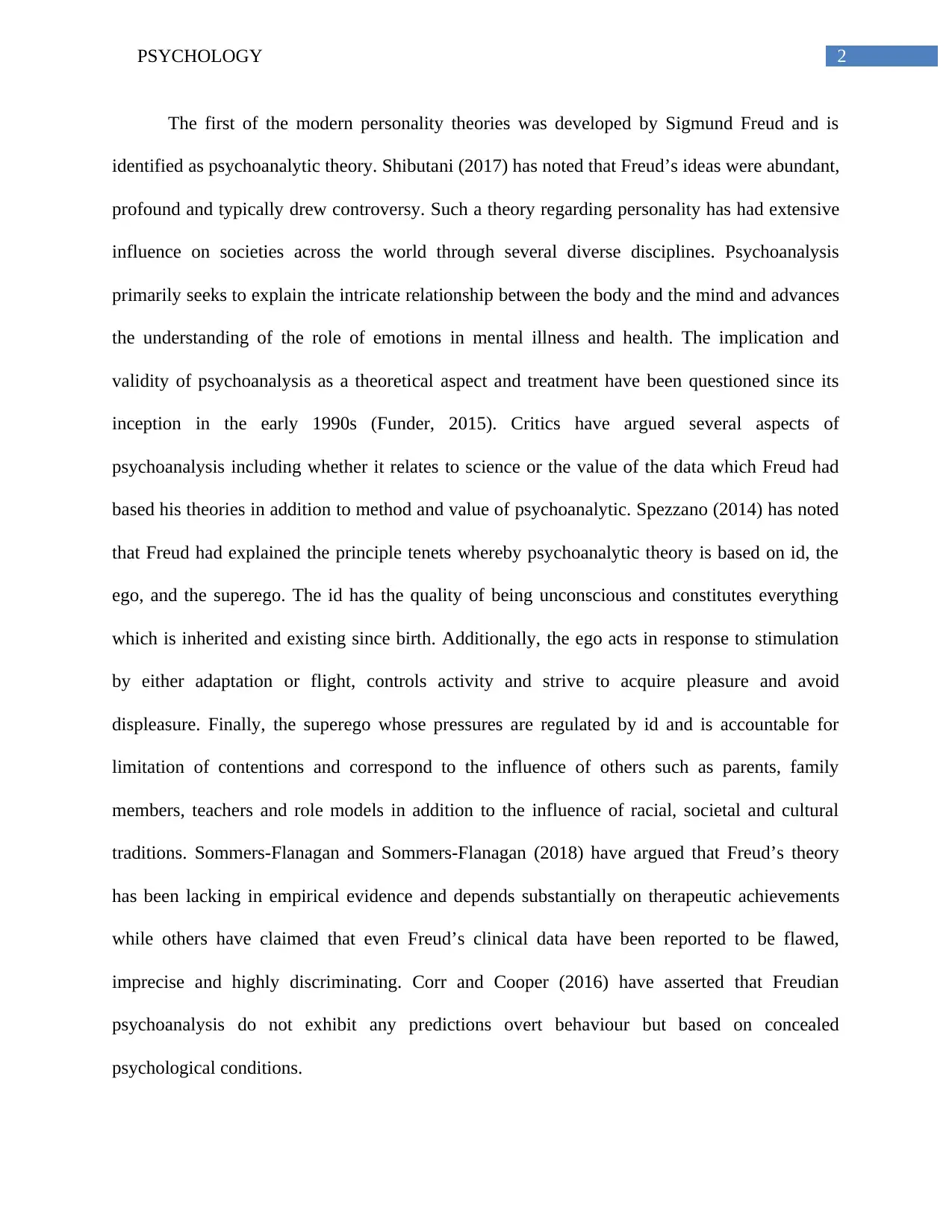
2PSYCHOLOGY
The first of the modern personality theories was developed by Sigmund Freud and is
identified as psychoanalytic theory. Shibutani (2017) has noted that Freud’s ideas were abundant,
profound and typically drew controversy. Such a theory regarding personality has had extensive
influence on societies across the world through several diverse disciplines. Psychoanalysis
primarily seeks to explain the intricate relationship between the body and the mind and advances
the understanding of the role of emotions in mental illness and health. The implication and
validity of psychoanalysis as a theoretical aspect and treatment have been questioned since its
inception in the early 1990s (Funder, 2015). Critics have argued several aspects of
psychoanalysis including whether it relates to science or the value of the data which Freud had
based his theories in addition to method and value of psychoanalytic. Spezzano (2014) has noted
that Freud had explained the principle tenets whereby psychoanalytic theory is based on id, the
ego, and the superego. The id has the quality of being unconscious and constitutes everything
which is inherited and existing since birth. Additionally, the ego acts in response to stimulation
by either adaptation or flight, controls activity and strive to acquire pleasure and avoid
displeasure. Finally, the superego whose pressures are regulated by id and is accountable for
limitation of contentions and correspond to the influence of others such as parents, family
members, teachers and role models in addition to the influence of racial, societal and cultural
traditions. Sommers-Flanagan and Sommers-Flanagan (2018) have argued that Freud’s theory
has been lacking in empirical evidence and depends substantially on therapeutic achievements
while others have claimed that even Freud’s clinical data have been reported to be flawed,
imprecise and highly discriminating. Corr and Cooper (2016) have asserted that Freudian
psychoanalysis do not exhibit any predictions overt behaviour but based on concealed
psychological conditions.
The first of the modern personality theories was developed by Sigmund Freud and is
identified as psychoanalytic theory. Shibutani (2017) has noted that Freud’s ideas were abundant,
profound and typically drew controversy. Such a theory regarding personality has had extensive
influence on societies across the world through several diverse disciplines. Psychoanalysis
primarily seeks to explain the intricate relationship between the body and the mind and advances
the understanding of the role of emotions in mental illness and health. The implication and
validity of psychoanalysis as a theoretical aspect and treatment have been questioned since its
inception in the early 1990s (Funder, 2015). Critics have argued several aspects of
psychoanalysis including whether it relates to science or the value of the data which Freud had
based his theories in addition to method and value of psychoanalytic. Spezzano (2014) has noted
that Freud had explained the principle tenets whereby psychoanalytic theory is based on id, the
ego, and the superego. The id has the quality of being unconscious and constitutes everything
which is inherited and existing since birth. Additionally, the ego acts in response to stimulation
by either adaptation or flight, controls activity and strive to acquire pleasure and avoid
displeasure. Finally, the superego whose pressures are regulated by id and is accountable for
limitation of contentions and correspond to the influence of others such as parents, family
members, teachers and role models in addition to the influence of racial, societal and cultural
traditions. Sommers-Flanagan and Sommers-Flanagan (2018) have argued that Freud’s theory
has been lacking in empirical evidence and depends substantially on therapeutic achievements
while others have claimed that even Freud’s clinical data have been reported to be flawed,
imprecise and highly discriminating. Corr and Cooper (2016) have asserted that Freudian
psychoanalysis do not exhibit any predictions overt behaviour but based on concealed
psychological conditions.
⊘ This is a preview!⊘
Do you want full access?
Subscribe today to unlock all pages.

Trusted by 1+ million students worldwide

3PSYCHOLOGY
Meanwhile, Spezzano (2014) has claimed that has typically maintained that every human
being is neurotic to certain extent because of trauma and repression individuals have suffered
thus resulting to repress the trauma at one point in their lives. However, such a concept related to
ubiquitous repression is unattainable to test due to the lack of overt behavioural method of
execution. On the other hand, Shibutani (2017) has argued that Freudian psychoanalysis cannot
be distinguished as a scientific discipline as it lacks predictions. Drawing relevance from these
assertions Kline (2014) has stated that certain childhood events related to molestation, violence
or abuse tend to produce certain outcomes or conditions of neurosis. However, in order to
proceed with such claims, individuals must develop the competence to predict that if children
encounter certain abusive experiences abuse for instance they become characterized by certain
personality traits and attributes. Moreover, such a concept would be able to theoretically perform
in reverse. For example, Sommers-Flanagan and Sommers-Flanagan (2018) have opined that if
individuals are studied within neurotic conditions, an individual should attain the competence to
predict their childhood experience. However, these predictions can never be developed with
accuracy. While Shibutani (2017) has asserted that Freudian theory of personality cannot be
falsified and thus does not result to be scientific, Eysenck claimed that as Freud’s theoretical
assumptions can be inaccurate they tend to draw scientific explanations. Furthermore, Corr and
Cooper (2016) have harmonized with Eysenck’s assertions stating that Freud’s theory can be
fabricated it can be considered as scientific, thus asserting that Freudian personality theory of
psychoanalysis can be proven wrong.
However, to assess the areas of strengths related to Freud’s theory of psychoanalysis, it is
imperative to consider certain attributes of the theory. Revelle (2014) has shed light on the
efficacy of the theory whereby it seeks critical problems and its relevant application through
Meanwhile, Spezzano (2014) has claimed that has typically maintained that every human
being is neurotic to certain extent because of trauma and repression individuals have suffered
thus resulting to repress the trauma at one point in their lives. However, such a concept related to
ubiquitous repression is unattainable to test due to the lack of overt behavioural method of
execution. On the other hand, Shibutani (2017) has argued that Freudian psychoanalysis cannot
be distinguished as a scientific discipline as it lacks predictions. Drawing relevance from these
assertions Kline (2014) has stated that certain childhood events related to molestation, violence
or abuse tend to produce certain outcomes or conditions of neurosis. However, in order to
proceed with such claims, individuals must develop the competence to predict that if children
encounter certain abusive experiences abuse for instance they become characterized by certain
personality traits and attributes. Moreover, such a concept would be able to theoretically perform
in reverse. For example, Sommers-Flanagan and Sommers-Flanagan (2018) have opined that if
individuals are studied within neurotic conditions, an individual should attain the competence to
predict their childhood experience. However, these predictions can never be developed with
accuracy. While Shibutani (2017) has asserted that Freudian theory of personality cannot be
falsified and thus does not result to be scientific, Eysenck claimed that as Freud’s theoretical
assumptions can be inaccurate they tend to draw scientific explanations. Furthermore, Corr and
Cooper (2016) have harmonized with Eysenck’s assertions stating that Freud’s theory can be
fabricated it can be considered as scientific, thus asserting that Freudian personality theory of
psychoanalysis can be proven wrong.
However, to assess the areas of strengths related to Freud’s theory of psychoanalysis, it is
imperative to consider certain attributes of the theory. Revelle (2014) has shed light on the
efficacy of the theory whereby it seeks critical problems and its relevant application through
Paraphrase This Document
Need a fresh take? Get an instant paraphrase of this document with our AI Paraphraser
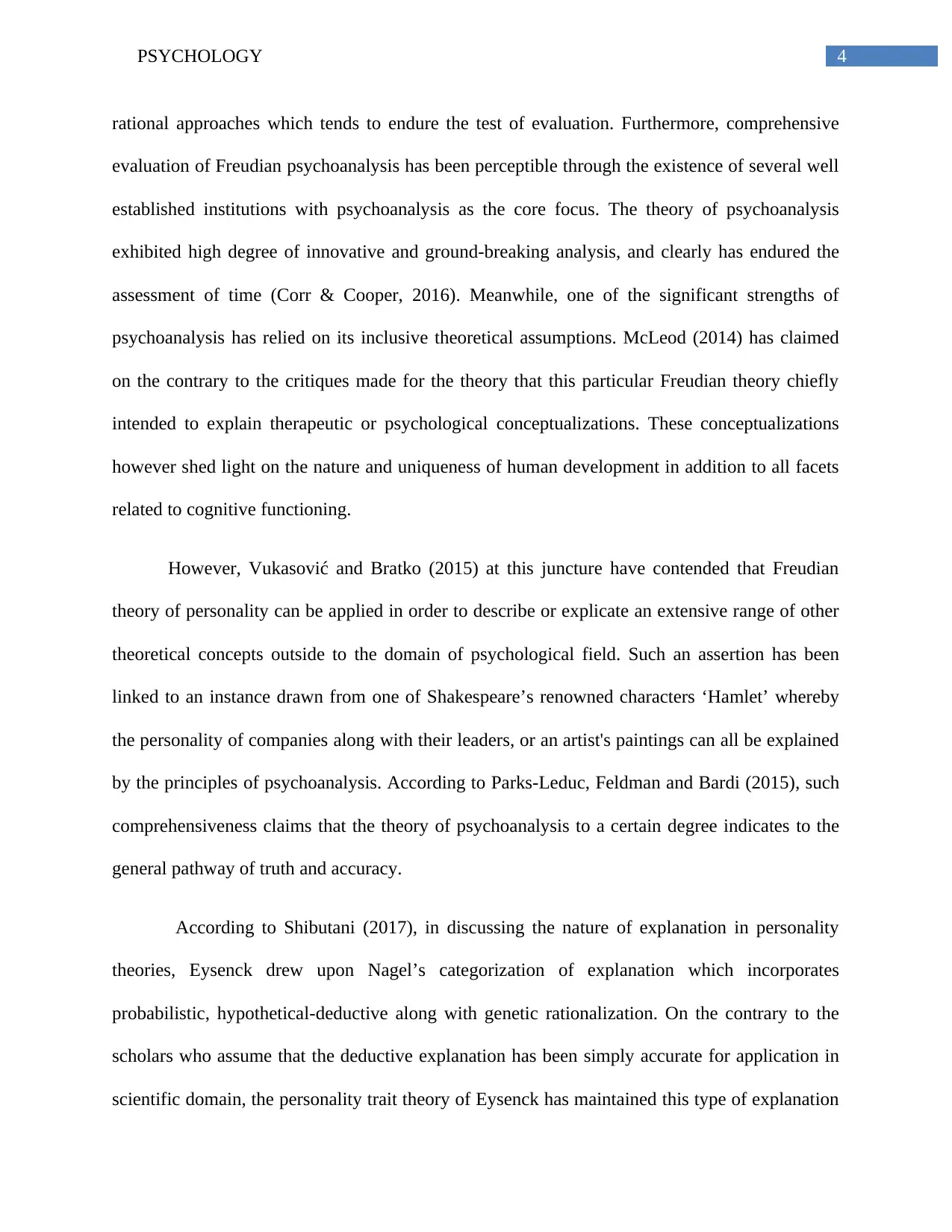
4PSYCHOLOGY
rational approaches which tends to endure the test of evaluation. Furthermore, comprehensive
evaluation of Freudian psychoanalysis has been perceptible through the existence of several well
established institutions with psychoanalysis as the core focus. The theory of psychoanalysis
exhibited high degree of innovative and ground-breaking analysis, and clearly has endured the
assessment of time (Corr & Cooper, 2016). Meanwhile, one of the significant strengths of
psychoanalysis has relied on its inclusive theoretical assumptions. McLeod (2014) has claimed
on the contrary to the critiques made for the theory that this particular Freudian theory chiefly
intended to explain therapeutic or psychological conceptualizations. These conceptualizations
however shed light on the nature and uniqueness of human development in addition to all facets
related to cognitive functioning.
However, Vukasović and Bratko (2015) at this juncture have contended that Freudian
theory of personality can be applied in order to describe or explicate an extensive range of other
theoretical concepts outside to the domain of psychological field. Such an assertion has been
linked to an instance drawn from one of Shakespeare’s renowned characters ‘Hamlet’ whereby
the personality of companies along with their leaders, or an artist's paintings can all be explained
by the principles of psychoanalysis. According to Parks-Leduc, Feldman and Bardi (2015), such
comprehensiveness claims that the theory of psychoanalysis to a certain degree indicates to the
general pathway of truth and accuracy.
According to Shibutani (2017), in discussing the nature of explanation in personality
theories, Eysenck drew upon Nagel’s categorization of explanation which incorporates
probabilistic, hypothetical-deductive along with genetic rationalization. On the contrary to the
scholars who assume that the deductive explanation has been simply accurate for application in
scientific domain, the personality trait theory of Eysenck has maintained this type of explanation
rational approaches which tends to endure the test of evaluation. Furthermore, comprehensive
evaluation of Freudian psychoanalysis has been perceptible through the existence of several well
established institutions with psychoanalysis as the core focus. The theory of psychoanalysis
exhibited high degree of innovative and ground-breaking analysis, and clearly has endured the
assessment of time (Corr & Cooper, 2016). Meanwhile, one of the significant strengths of
psychoanalysis has relied on its inclusive theoretical assumptions. McLeod (2014) has claimed
on the contrary to the critiques made for the theory that this particular Freudian theory chiefly
intended to explain therapeutic or psychological conceptualizations. These conceptualizations
however shed light on the nature and uniqueness of human development in addition to all facets
related to cognitive functioning.
However, Vukasović and Bratko (2015) at this juncture have contended that Freudian
theory of personality can be applied in order to describe or explicate an extensive range of other
theoretical concepts outside to the domain of psychological field. Such an assertion has been
linked to an instance drawn from one of Shakespeare’s renowned characters ‘Hamlet’ whereby
the personality of companies along with their leaders, or an artist's paintings can all be explained
by the principles of psychoanalysis. According to Parks-Leduc, Feldman and Bardi (2015), such
comprehensiveness claims that the theory of psychoanalysis to a certain degree indicates to the
general pathway of truth and accuracy.
According to Shibutani (2017), in discussing the nature of explanation in personality
theories, Eysenck drew upon Nagel’s categorization of explanation which incorporates
probabilistic, hypothetical-deductive along with genetic rationalization. On the contrary to the
scholars who assume that the deductive explanation has been simply accurate for application in
scientific domain, the personality trait theory of Eysenck has maintained this type of explanation
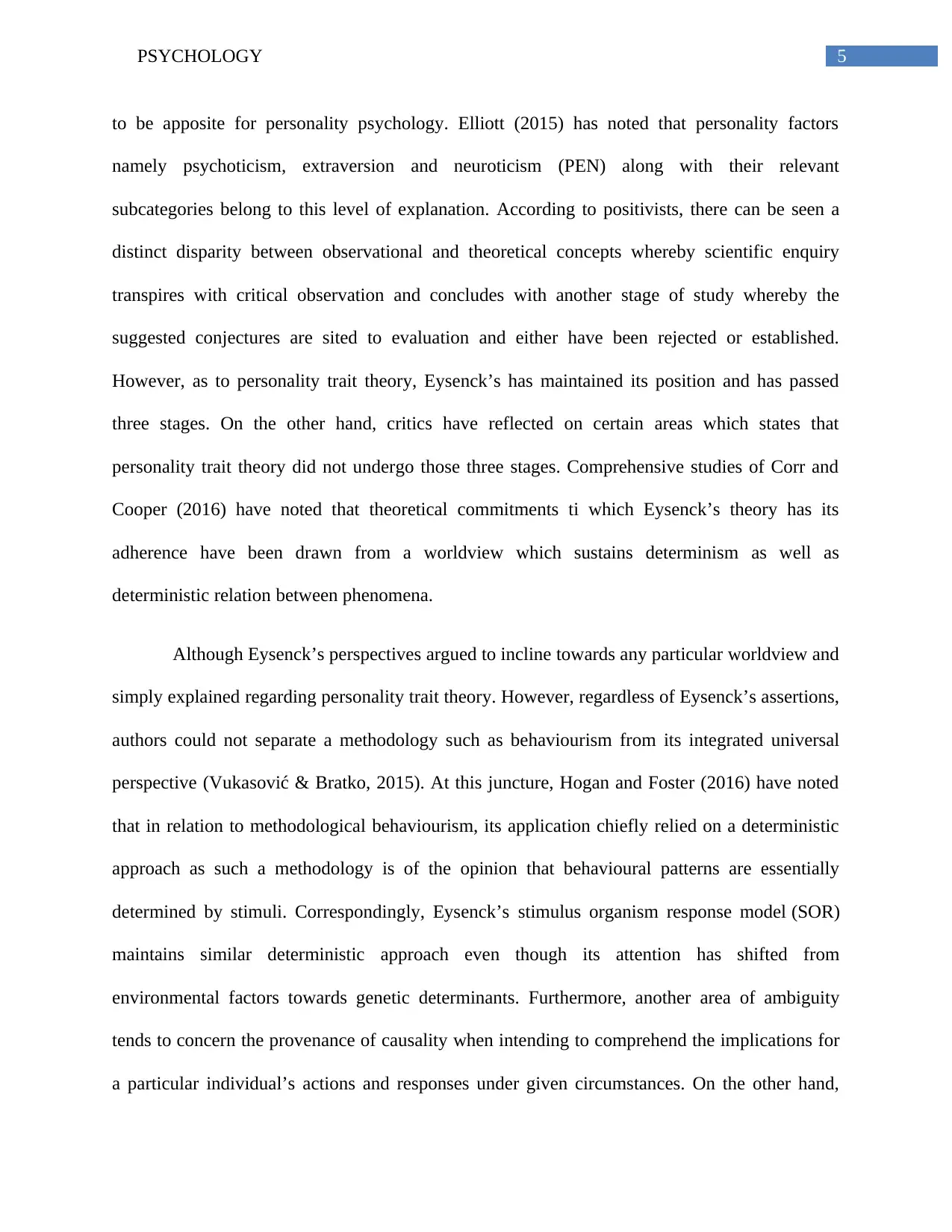
5PSYCHOLOGY
to be apposite for personality psychology. Elliott (2015) has noted that personality factors
namely psychoticism, extraversion and neuroticism (PEN) along with their relevant
subcategories belong to this level of explanation. According to positivists, there can be seen a
distinct disparity between observational and theoretical concepts whereby scientific enquiry
transpires with critical observation and concludes with another stage of study whereby the
suggested conjectures are sited to evaluation and either have been rejected or established.
However, as to personality trait theory, Eysenck’s has maintained its position and has passed
three stages. On the other hand, critics have reflected on certain areas which states that
personality trait theory did not undergo those three stages. Comprehensive studies of Corr and
Cooper (2016) have noted that theoretical commitments ti which Eysenck’s theory has its
adherence have been drawn from a worldview which sustains determinism as well as
deterministic relation between phenomena.
Although Eysenck’s perspectives argued to incline towards any particular worldview and
simply explained regarding personality trait theory. However, regardless of Eysenck’s assertions,
authors could not separate a methodology such as behaviourism from its integrated universal
perspective (Vukasović & Bratko, 2015). At this juncture, Hogan and Foster (2016) have noted
that in relation to methodological behaviourism, its application chiefly relied on a deterministic
approach as such a methodology is of the opinion that behavioural patterns are essentially
determined by stimuli. Correspondingly, Eysenck’s stimulus organism response model (SOR)
maintains similar deterministic approach even though its attention has shifted from
environmental factors towards genetic determinants. Furthermore, another area of ambiguity
tends to concern the provenance of causality when intending to comprehend the implications for
a particular individual’s actions and responses under given circumstances. On the other hand,
to be apposite for personality psychology. Elliott (2015) has noted that personality factors
namely psychoticism, extraversion and neuroticism (PEN) along with their relevant
subcategories belong to this level of explanation. According to positivists, there can be seen a
distinct disparity between observational and theoretical concepts whereby scientific enquiry
transpires with critical observation and concludes with another stage of study whereby the
suggested conjectures are sited to evaluation and either have been rejected or established.
However, as to personality trait theory, Eysenck’s has maintained its position and has passed
three stages. On the other hand, critics have reflected on certain areas which states that
personality trait theory did not undergo those three stages. Comprehensive studies of Corr and
Cooper (2016) have noted that theoretical commitments ti which Eysenck’s theory has its
adherence have been drawn from a worldview which sustains determinism as well as
deterministic relation between phenomena.
Although Eysenck’s perspectives argued to incline towards any particular worldview and
simply explained regarding personality trait theory. However, regardless of Eysenck’s assertions,
authors could not separate a methodology such as behaviourism from its integrated universal
perspective (Vukasović & Bratko, 2015). At this juncture, Hogan and Foster (2016) have noted
that in relation to methodological behaviourism, its application chiefly relied on a deterministic
approach as such a methodology is of the opinion that behavioural patterns are essentially
determined by stimuli. Correspondingly, Eysenck’s stimulus organism response model (SOR)
maintains similar deterministic approach even though its attention has shifted from
environmental factors towards genetic determinants. Furthermore, another area of ambiguity
tends to concern the provenance of causality when intending to comprehend the implications for
a particular individual’s actions and responses under given circumstances. On the other hand,
⊘ This is a preview!⊘
Do you want full access?
Subscribe today to unlock all pages.

Trusted by 1+ million students worldwide

6PSYCHOLOGY
Eysenck indicated that the direction of causality do not typically advance towards any specific
direction such as from the biological or genetic processes to the behavioral side (Revelle, 2014).
Additionally, drawing credence to studies which investigate the influence of testosterone
levels on behaviour, McLeod (2014) has opined that aggressive as well as sexual behavioral
patterns have the tendency to shift levels of testosterone released in the body while concurrently
being influenced by this level. However, a vital point which concerns the association between
factors and the structure of reality. Hatemi and Verhulst (2015) have noted that such an issue has
been subjective to intensive discourses which believe that factor analysis is not imperative
condition to separating the structure of personality. Furthermore, certain arguments have been
concerning with the method of factor analysis that has been applied by Eysenck’s as the primary
method in establishing personality dimensions. However, critics inclined towards this method
have argued that factor analysis primarily has been based on mathematical procedure applied in
order to summarize the sources variability in the set of scores provided by some questionnaire.
(Vukasović and Bratko (2015) have stated that yes and no questions could not possibly be
systematic to the degree to understand the diverse aspects of personality. According to Hogan
and Foster (2016), such a method can make the structure of meaning of trait words and
terminologies distinct and less ambiguous. This is because correlations amongst personality
words offered by this factor analysis method increase the feasibility to explore which of the
wordings are subsumed under indistinct words.
Nevertheless the argument states that such a method does not necessarily signify that
factors analysis cam reveal the structure of realism and truth. Moreover, another criticism for
Eysenck’s personality theory have opined that realism breaks into sphere of factor analysis when
there can be identified certain unexpected correlations among some elements of the questionnaire
Eysenck indicated that the direction of causality do not typically advance towards any specific
direction such as from the biological or genetic processes to the behavioral side (Revelle, 2014).
Additionally, drawing credence to studies which investigate the influence of testosterone
levels on behaviour, McLeod (2014) has opined that aggressive as well as sexual behavioral
patterns have the tendency to shift levels of testosterone released in the body while concurrently
being influenced by this level. However, a vital point which concerns the association between
factors and the structure of reality. Hatemi and Verhulst (2015) have noted that such an issue has
been subjective to intensive discourses which believe that factor analysis is not imperative
condition to separating the structure of personality. Furthermore, certain arguments have been
concerning with the method of factor analysis that has been applied by Eysenck’s as the primary
method in establishing personality dimensions. However, critics inclined towards this method
have argued that factor analysis primarily has been based on mathematical procedure applied in
order to summarize the sources variability in the set of scores provided by some questionnaire.
(Vukasović and Bratko (2015) have stated that yes and no questions could not possibly be
systematic to the degree to understand the diverse aspects of personality. According to Hogan
and Foster (2016), such a method can make the structure of meaning of trait words and
terminologies distinct and less ambiguous. This is because correlations amongst personality
words offered by this factor analysis method increase the feasibility to explore which of the
wordings are subsumed under indistinct words.
Nevertheless the argument states that such a method does not necessarily signify that
factors analysis cam reveal the structure of realism and truth. Moreover, another criticism for
Eysenck’s personality theory have opined that realism breaks into sphere of factor analysis when
there can be identified certain unexpected correlations among some elements of the questionnaire
Paraphrase This Document
Need a fresh take? Get an instant paraphrase of this document with our AI Paraphraser

7PSYCHOLOGY
which resulted to unanticipated linkages. Nevertheless, regardless of these criticisms Spezzano
(2014) have noted that Eysenck’s personality theory continued to combine what have been
perceived to be the paramount theories from experimental psychology in correspondence to
factor analytic results. Furthermore, another major area of strength of Eysenck’s theory relies on
its capacity to distinguish observable behavioural patterns. Parks-Leduc, Feldman and Bardi
(2015) have found that evaluating the collective behavioural patterns of individuals offers strong
association with personality or traits and observing behaviours of individuals in shifting
conditions which will provides evidence for the personality traits characterized in trait theories.
At this juncture, it is essential to note that both Eysenck and Freud emphasized on
conceiving similar cognitive increased level of mechanisms which tend to call for stimulation of
arousal needs in the view of Eysenck or the contentment of sexual desires as per Freudian’s
psychoanalysis. Gawronski and De Houwer (2014) have noted that Freudian personality asserted
the absolute nature of the sexual ‘pleasure principle’ instinctive in all humans which calls for
immediate indulgence by all means. On the other hand, Eysenck’s trait theory offers more
discriminative categorization of human stimulation in the form of two poles comprising of
extraversion as well as introversion. Moreover, drawing contradiction to psychoanalysis
theoretical aspects, Eysenck’s applied statistics in order to support the implication of these
personality factors. Furthermore, at the centre for Eysenck personality theory primarily acquired
by birth while as per Freudian personality theory, childhood development tends to be the most
significantly determining individual growth (Shibutani, 2017).
which resulted to unanticipated linkages. Nevertheless, regardless of these criticisms Spezzano
(2014) have noted that Eysenck’s personality theory continued to combine what have been
perceived to be the paramount theories from experimental psychology in correspondence to
factor analytic results. Furthermore, another major area of strength of Eysenck’s theory relies on
its capacity to distinguish observable behavioural patterns. Parks-Leduc, Feldman and Bardi
(2015) have found that evaluating the collective behavioural patterns of individuals offers strong
association with personality or traits and observing behaviours of individuals in shifting
conditions which will provides evidence for the personality traits characterized in trait theories.
At this juncture, it is essential to note that both Eysenck and Freud emphasized on
conceiving similar cognitive increased level of mechanisms which tend to call for stimulation of
arousal needs in the view of Eysenck or the contentment of sexual desires as per Freudian’s
psychoanalysis. Gawronski and De Houwer (2014) have noted that Freudian personality asserted
the absolute nature of the sexual ‘pleasure principle’ instinctive in all humans which calls for
immediate indulgence by all means. On the other hand, Eysenck’s trait theory offers more
discriminative categorization of human stimulation in the form of two poles comprising of
extraversion as well as introversion. Moreover, drawing contradiction to psychoanalysis
theoretical aspects, Eysenck’s applied statistics in order to support the implication of these
personality factors. Furthermore, at the centre for Eysenck personality theory primarily acquired
by birth while as per Freudian personality theory, childhood development tends to be the most
significantly determining individual growth (Shibutani, 2017).
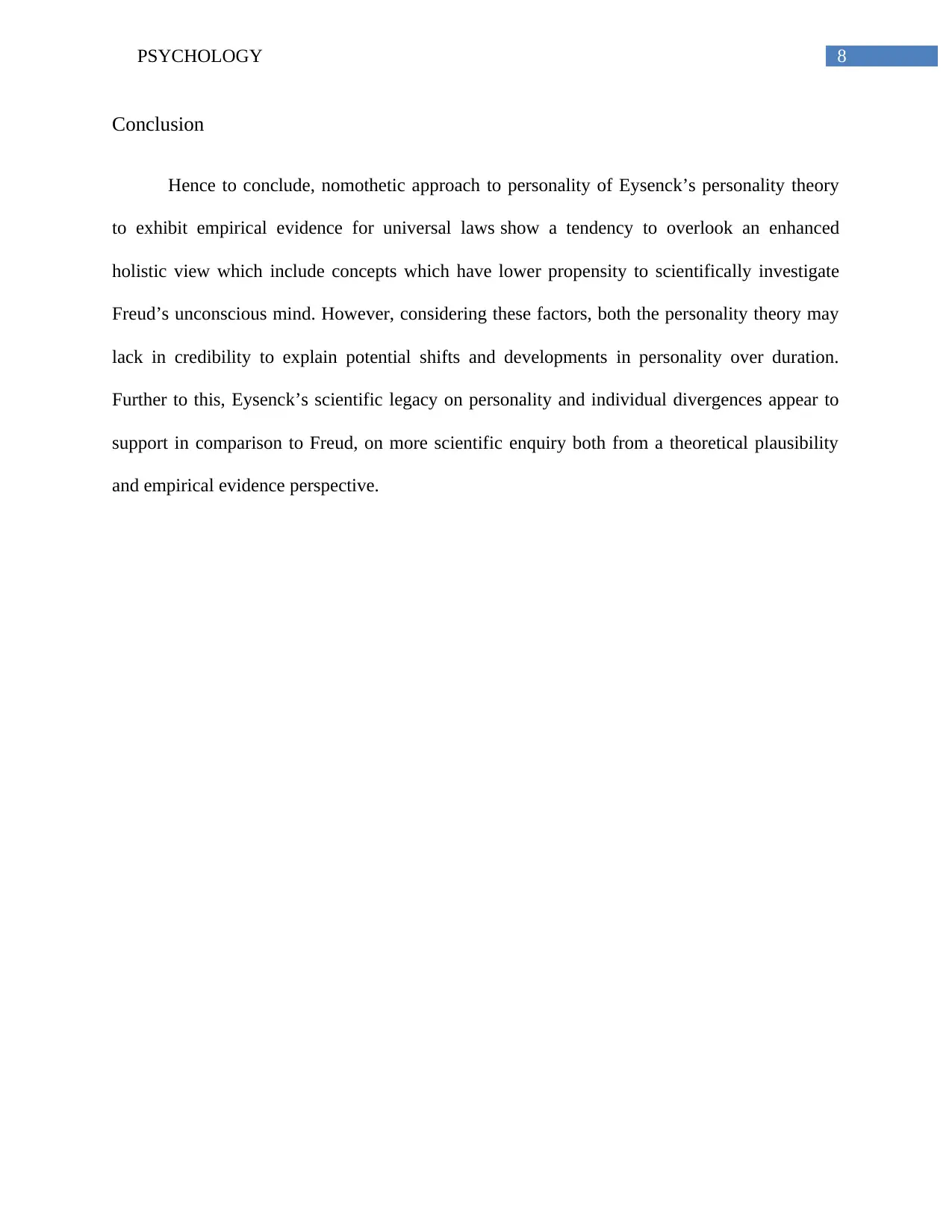
8PSYCHOLOGY
Conclusion
Hence to conclude, nomothetic approach to personality of Eysenck’s personality theory
to exhibit empirical evidence for universal laws show a tendency to overlook an enhanced
holistic view which include concepts which have lower propensity to scientifically investigate
Freud’s unconscious mind. However, considering these factors, both the personality theory may
lack in credibility to explain potential shifts and developments in personality over duration.
Further to this, Eysenck’s scientific legacy on personality and individual divergences appear to
support in comparison to Freud, on more scientific enquiry both from a theoretical plausibility
and empirical evidence perspective.
Conclusion
Hence to conclude, nomothetic approach to personality of Eysenck’s personality theory
to exhibit empirical evidence for universal laws show a tendency to overlook an enhanced
holistic view which include concepts which have lower propensity to scientifically investigate
Freud’s unconscious mind. However, considering these factors, both the personality theory may
lack in credibility to explain potential shifts and developments in personality over duration.
Further to this, Eysenck’s scientific legacy on personality and individual divergences appear to
support in comparison to Freud, on more scientific enquiry both from a theoretical plausibility
and empirical evidence perspective.
⊘ This is a preview!⊘
Do you want full access?
Subscribe today to unlock all pages.

Trusted by 1+ million students worldwide
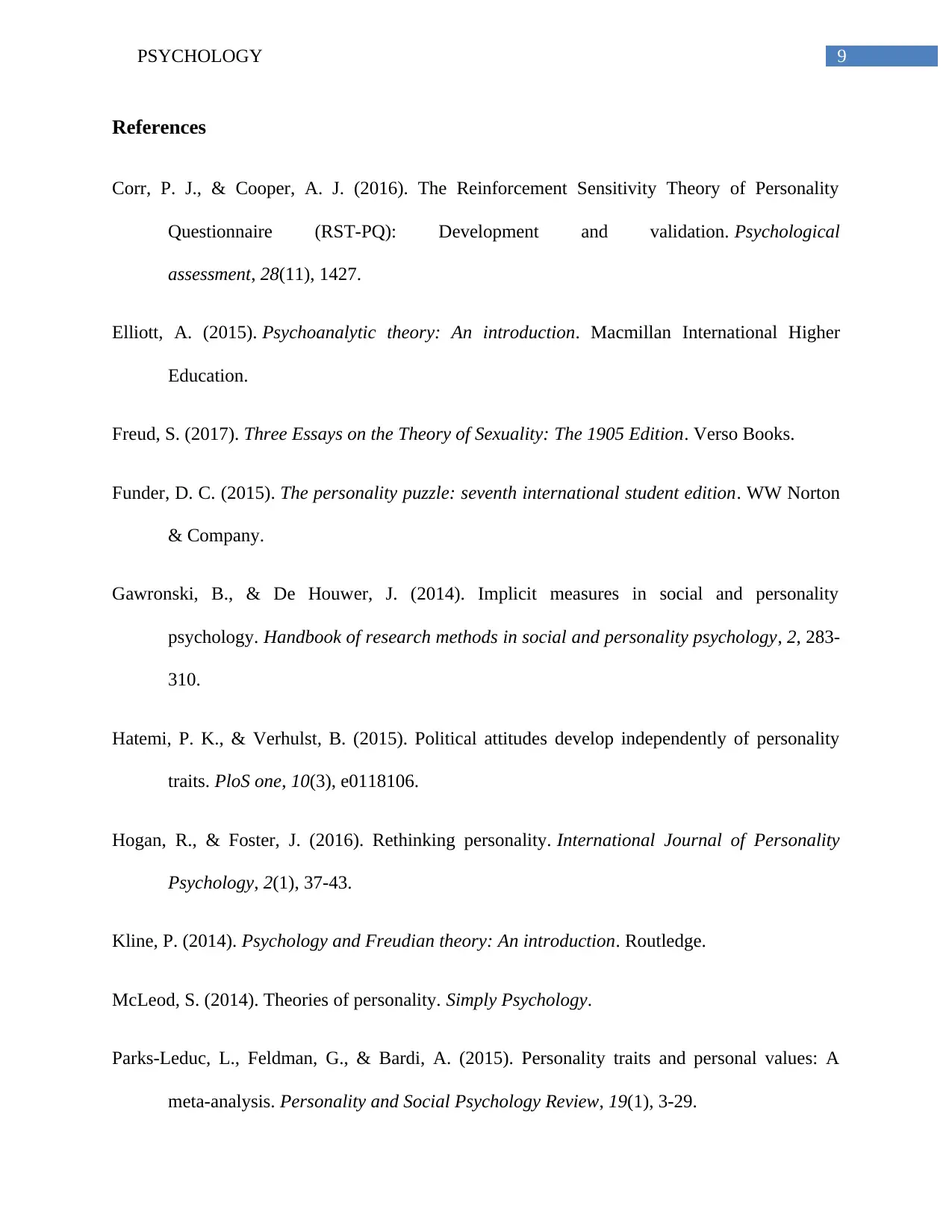
9PSYCHOLOGY
References
Corr, P. J., & Cooper, A. J. (2016). The Reinforcement Sensitivity Theory of Personality
Questionnaire (RST-PQ): Development and validation. Psychological
assessment, 28(11), 1427.
Elliott, A. (2015). Psychoanalytic theory: An introduction. Macmillan International Higher
Education.
Freud, S. (2017). Three Essays on the Theory of Sexuality: The 1905 Edition. Verso Books.
Funder, D. C. (2015). The personality puzzle: seventh international student edition. WW Norton
& Company.
Gawronski, B., & De Houwer, J. (2014). Implicit measures in social and personality
psychology. Handbook of research methods in social and personality psychology, 2, 283-
310.
Hatemi, P. K., & Verhulst, B. (2015). Political attitudes develop independently of personality
traits. PloS one, 10(3), e0118106.
Hogan, R., & Foster, J. (2016). Rethinking personality. International Journal of Personality
Psychology, 2(1), 37-43.
Kline, P. (2014). Psychology and Freudian theory: An introduction. Routledge.
McLeod, S. (2014). Theories of personality. Simply Psychology.
Parks-Leduc, L., Feldman, G., & Bardi, A. (2015). Personality traits and personal values: A
meta-analysis. Personality and Social Psychology Review, 19(1), 3-29.
References
Corr, P. J., & Cooper, A. J. (2016). The Reinforcement Sensitivity Theory of Personality
Questionnaire (RST-PQ): Development and validation. Psychological
assessment, 28(11), 1427.
Elliott, A. (2015). Psychoanalytic theory: An introduction. Macmillan International Higher
Education.
Freud, S. (2017). Three Essays on the Theory of Sexuality: The 1905 Edition. Verso Books.
Funder, D. C. (2015). The personality puzzle: seventh international student edition. WW Norton
& Company.
Gawronski, B., & De Houwer, J. (2014). Implicit measures in social and personality
psychology. Handbook of research methods in social and personality psychology, 2, 283-
310.
Hatemi, P. K., & Verhulst, B. (2015). Political attitudes develop independently of personality
traits. PloS one, 10(3), e0118106.
Hogan, R., & Foster, J. (2016). Rethinking personality. International Journal of Personality
Psychology, 2(1), 37-43.
Kline, P. (2014). Psychology and Freudian theory: An introduction. Routledge.
McLeod, S. (2014). Theories of personality. Simply Psychology.
Parks-Leduc, L., Feldman, G., & Bardi, A. (2015). Personality traits and personal values: A
meta-analysis. Personality and Social Psychology Review, 19(1), 3-29.
Paraphrase This Document
Need a fresh take? Get an instant paraphrase of this document with our AI Paraphraser

10PSYCHOLOGY
Revelle, W. (2014). Hans J. Eysenck. Northwestern University Publication.
Schultz, D. P., & Schultz, S. E. (2016). Theories of personality. Cengage Learning.
Shibutani, T. (2017). Society and Personality: Interactionist Approach to Social Psychology.
Routledge.
Sommers-Flanagan, J., & Sommers-Flanagan, R. (2018). Counseling and psychotherapy theories
in context and practice: Skills, strategies, and techniques. John Wiley & Sons.
Spezzano, C. (2014). Affect in psychoanalysis: A clinical synthesis. Routledge.
Vukasović, T., & Bratko, D. (2015). Heritability of personality: a meta-analysis of behavior
genetic studies. Psychological bulletin, 141(4), 769.
Revelle, W. (2014). Hans J. Eysenck. Northwestern University Publication.
Schultz, D. P., & Schultz, S. E. (2016). Theories of personality. Cengage Learning.
Shibutani, T. (2017). Society and Personality: Interactionist Approach to Social Psychology.
Routledge.
Sommers-Flanagan, J., & Sommers-Flanagan, R. (2018). Counseling and psychotherapy theories
in context and practice: Skills, strategies, and techniques. John Wiley & Sons.
Spezzano, C. (2014). Affect in psychoanalysis: A clinical synthesis. Routledge.
Vukasović, T., & Bratko, D. (2015). Heritability of personality: a meta-analysis of behavior
genetic studies. Psychological bulletin, 141(4), 769.
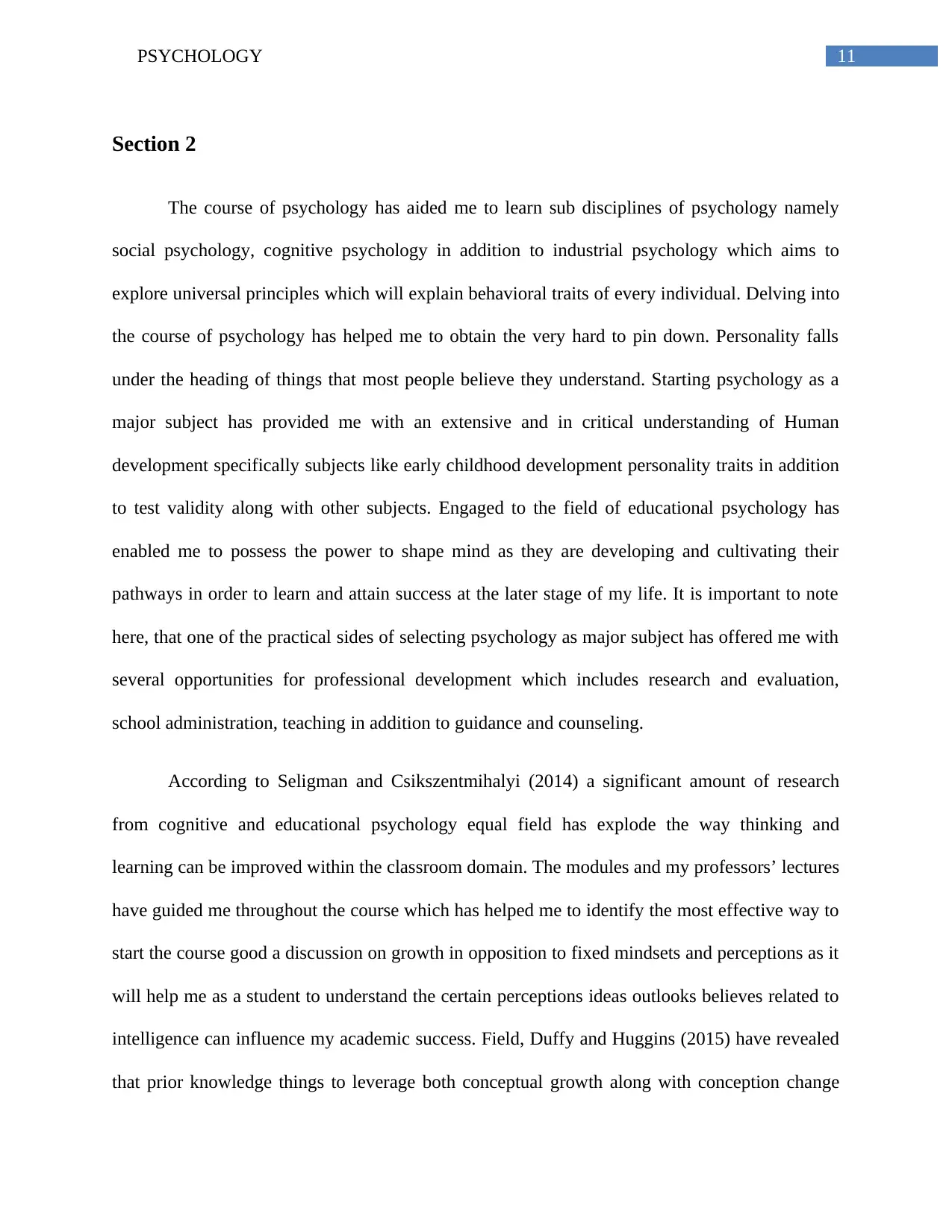
11PSYCHOLOGY
Section 2
The course of psychology has aided me to learn sub disciplines of psychology namely
social psychology, cognitive psychology in addition to industrial psychology which aims to
explore universal principles which will explain behavioral traits of every individual. Delving into
the course of psychology has helped me to obtain the very hard to pin down. Personality falls
under the heading of things that most people believe they understand. Starting psychology as a
major subject has provided me with an extensive and in critical understanding of Human
development specifically subjects like early childhood development personality traits in addition
to test validity along with other subjects. Engaged to the field of educational psychology has
enabled me to possess the power to shape mind as they are developing and cultivating their
pathways in order to learn and attain success at the later stage of my life. It is important to note
here, that one of the practical sides of selecting psychology as major subject has offered me with
several opportunities for professional development which includes research and evaluation,
school administration, teaching in addition to guidance and counseling.
According to Seligman and Csikszentmihalyi (2014) a significant amount of research
from cognitive and educational psychology equal field has explode the way thinking and
learning can be improved within the classroom domain. The modules and my professors’ lectures
have guided me throughout the course which has helped me to identify the most effective way to
start the course good a discussion on growth in opposition to fixed mindsets and perceptions as it
will help me as a student to understand the certain perceptions ideas outlooks believes related to
intelligence can influence my academic success. Field, Duffy and Huggins (2015) have revealed
that prior knowledge things to leverage both conceptual growth along with conception change
Section 2
The course of psychology has aided me to learn sub disciplines of psychology namely
social psychology, cognitive psychology in addition to industrial psychology which aims to
explore universal principles which will explain behavioral traits of every individual. Delving into
the course of psychology has helped me to obtain the very hard to pin down. Personality falls
under the heading of things that most people believe they understand. Starting psychology as a
major subject has provided me with an extensive and in critical understanding of Human
development specifically subjects like early childhood development personality traits in addition
to test validity along with other subjects. Engaged to the field of educational psychology has
enabled me to possess the power to shape mind as they are developing and cultivating their
pathways in order to learn and attain success at the later stage of my life. It is important to note
here, that one of the practical sides of selecting psychology as major subject has offered me with
several opportunities for professional development which includes research and evaluation,
school administration, teaching in addition to guidance and counseling.
According to Seligman and Csikszentmihalyi (2014) a significant amount of research
from cognitive and educational psychology equal field has explode the way thinking and
learning can be improved within the classroom domain. The modules and my professors’ lectures
have guided me throughout the course which has helped me to identify the most effective way to
start the course good a discussion on growth in opposition to fixed mindsets and perceptions as it
will help me as a student to understand the certain perceptions ideas outlooks believes related to
intelligence can influence my academic success. Field, Duffy and Huggins (2015) have revealed
that prior knowledge things to leverage both conceptual growth along with conception change
⊘ This is a preview!⊘
Do you want full access?
Subscribe today to unlock all pages.

Trusted by 1+ million students worldwide
1 out of 17
Related Documents
Your All-in-One AI-Powered Toolkit for Academic Success.
+13062052269
info@desklib.com
Available 24*7 on WhatsApp / Email
![[object Object]](/_next/static/media/star-bottom.7253800d.svg)
Unlock your academic potential
Copyright © 2020–2026 A2Z Services. All Rights Reserved. Developed and managed by ZUCOL.





